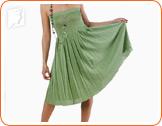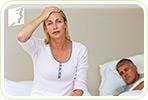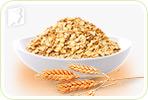
Everyone has to go shopping, and what you buy is generally dependent upon your needs. As you enter the menopausal transition and experience symptoms like night sweats, your needs may change. These brief moments of intense heat can be overwhelming and leave you cold and drenched in sweat, but by adding the certain items to your next shopping list, you can help relieve your night sweat symptoms.
The Grocery Store
No one likes being told what they can and cannot eat, but choosing some foods over others at the grocery store can help alleviate some of your night sweat symptoms.
Don't buy spicy foods

Spicy foods can significantly raise your body temperature and induce night sweats. Try to avoid all spicy foods and spices, including cayenne pepper and dried mustard, to see if your night sweats improve.
Try other seasonings
You don't have to eliminate all spices. Try some less potent, but still tasty herbal seasonings. Sage, lemongrass, and white peppercorns all have cooling properties.
Try phytoestrogenic foods
Some foods contain plant-based estrogens, which can help alleviate symptoms caused by the estrogen deficiency that often occurs during menopause. Apples, soy products, peas, lentils, and flaxseed are all foods that are rich in phytoestrogens, and they can easily be integrated into meals.
The Clothing Aisle

When dealing with symptoms like night sweats and hot flashes, clothing with breathable fabric is essential. The skin is an organ that needs oxygen, too. In general, cottons are recommended over synthetic fabrics like polyester and spandex. Tight-fitting clothes make it harder for the skin to breathe, making you more susceptible to night sweats.
Buy natural fibers
For linens and sheets, some anti-moisture fabrics are available, designed so that the bed does not get soaked and leave you feeling cold. If night sweats are an ongoing problem, it may be helpful to invest in special linens.
The Pharmacy
Style hair naturally

Instead of picking up a bottle of heat-activated product and a hair dryer, try some mousse to accentuate your hair's natural appearance and let it air dry. Processes that generate heat around your body, like hair drying, can trigger night sweats and hot flashes. Air-drying your hair will also reduce damage.
Recommendation
While cool compresses and other cold things may be tempting, they can confuse the body into thinking it is too cold and thus induce another night sweat episode. It is better to manage night sweats with lifestyle adjustments such as dietary changes.
For some women, lifestyle changes alone are not enough to combat persistent menopausal symptoms. In these cases, you should always talk to your doctor and discuss alternative treatments for night sweats. For more information, follow the links below.
Sources
- Boston Women's Health Collective. "Hot Flashes, Night Sweats and Sleep Disturbances". Our Bodies, Ourselves, 2006.
- The National Institute of Health.(n.d)."Signs of the Menopausal Transition" .Retrieved from www.nih.gov
- Von Muhlen, DG, et al. "A community-based study of menopause symptoms and estrogen replacement in older women". Maturitas. Sept 1995; 22(2):71-8.



